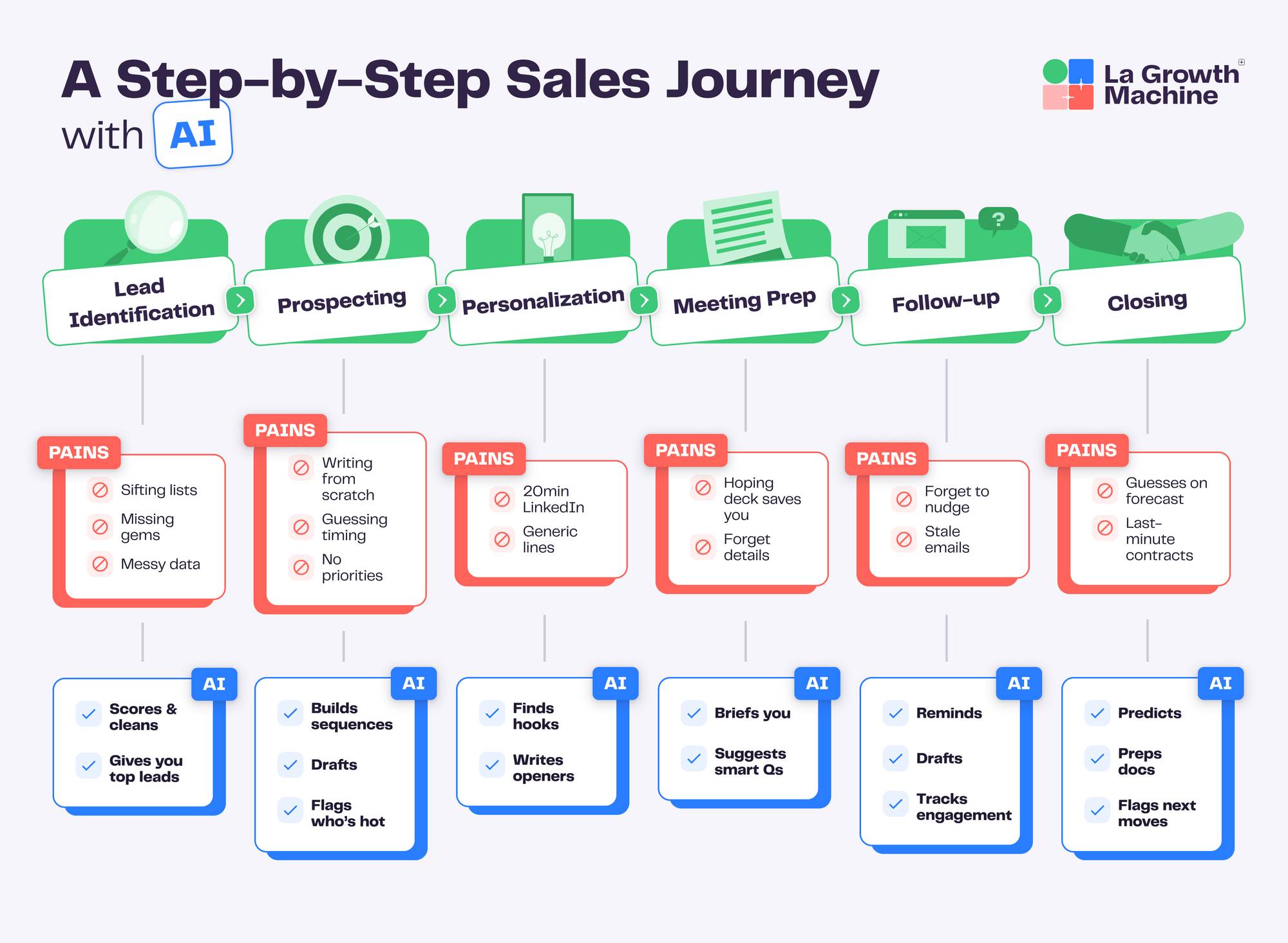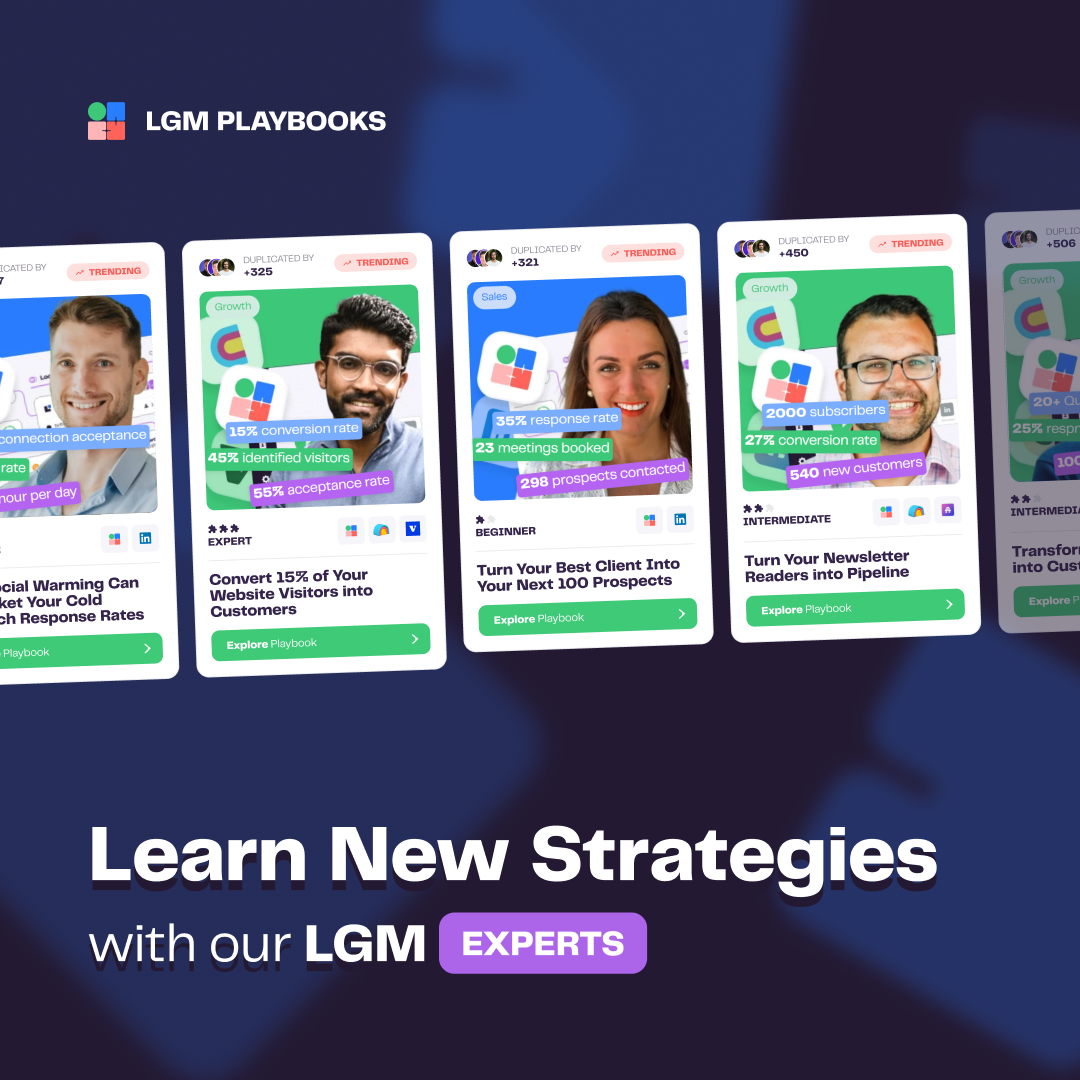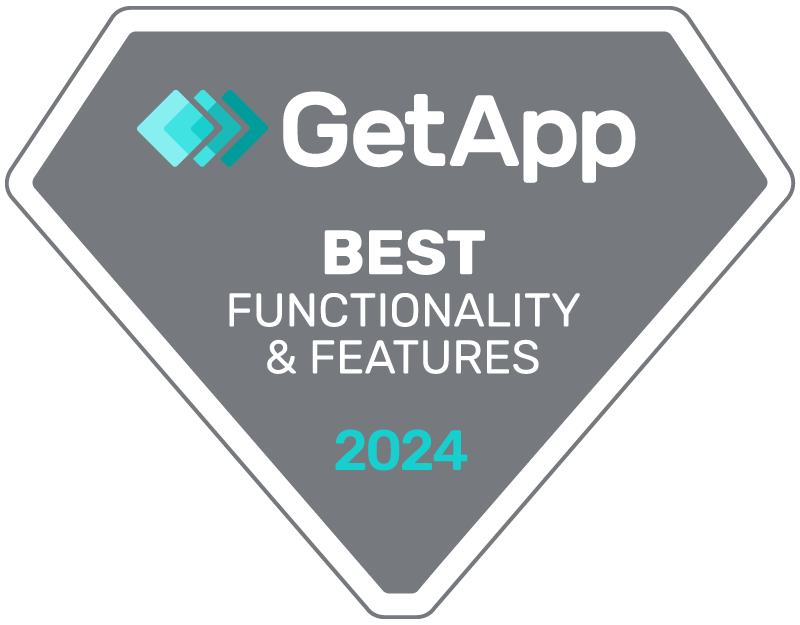Automate your multichannel sales outreach Try Multichannel
Try MultichannelTable of contents
The rise of AI sales technology isn’t just another tech trend, it is completely reshaping how we sell.
If your team still spends most of their day chasing spreadsheets, digging up contact info, or writing the same generic outreach, you’re wasting time and missing out on opportunities.
Most sales teams only actively work 40% of their assigned accounts. AI is changing the game by helping reps cover more ground, have sharper conversations, and close deals faster.
In this article, we’ll look at AI use cases sales teams can use to:
- Save hours on manual tasks
- Personalize outreach at scale
- Improve pipeline coverage and accuracy
- Close more deals
Quick Tip 💡
Ready to transform your sales process? Join our AI Sales course waiting list → to learn exactly how to implement these strategies.
What is AI for sales prospecting?
Before diving into specific AI use cases, it’s crucial to understand how AI for sales teams delivers measurable value.
AI brings real value to outbound prospecting by streamlining your workflow in three key areas:
- It automates time-consuming repetitive tasks like lead identification and account research
- It helps you draft and test your outbound campaigns more efficiently and can even create personalized icebreakers for each prospect on your list
- It provides predictive insights to better prioritize high-potential leads and prepare for likely objections a prospect will have
Here’s what makes AI truly valuable: it processes huge amounts of data (the kind that would take you weeks to analyze manually) to give you actionable insights that help you connect more effectively with your prospects.
Now, here are six ways sales teams are using AI to amplify (not replace) what they do best.
6 ways AI is transforming sales processes

1. Lead identification and account research
AI sales technology transforms both initial lead discovery and account research.
On the identification side, it scores and cleans lead data, eliminating common pains like messy lists and missed opportunities.
For account research, it scans financial reports, leadership changes, funding rounds, and market shifts to build comprehensive prospect profiles.
This approach means sales teams can quickly identify promising accounts and understand them deeply — from their tech stack to recent company news — without spending hours manually gathering data. The result is a more efficient pipeline built on both quantity and quality of insights.
2. Lead qualification

AI can handle lead qualification by analyzing both historical and firmographic data to predict which prospects are most likely to convert.
The system builds a dynamic ideal customer profile based on your successful deals — examining factors like company size, industry, tech stack, and buying patterns. It then scores new leads against this profile.
This means no more gut-feel qualification, so reps can focus on prospects that match patterns of past success rather than just those showing recent activity.

3. Message personalization
No more bland, one-size-fits-all messages.
AI sales agents can analyze company websites, social profiles, and industry data to create genuinely personalized messages. This goes beyond basic mail merge to identify relevant talking points — like recent company news, specific product features, or industry challenges.
Then, using natural language processing, it writes multi-line icebreakers that reference non-obvious details about each prospect’s business. This approach ensures every message feels individually researched, even when reaching out to hundreds of prospects.
Quick Tip 💡
Want to master AI-powered personalization?
Our upcoming Academy course provides a step-by-step implementation guide. Join the waiting list →
4. Meeting preparation

AI can cut down on hours of meeting prep by finding prospect information from multiple sources as soon as a meeting is scheduled.
This helps sales reps stay focused on relationship building by handling data collection and analysis in the background — pulling relevant company news, surfacing past interactions, and identifying likely pain points based on the prospect’s profile.
This allows reps to make the most of every prospect interaction without getting bogged down in research and admin work.
5. Automated follow-ups
An AI sales agent can handle follow-ups by combining real-time engagement tracking with intelligent outreach timing.
The system monitors prospect behavior — from time spent on pricing pages to case study downloads — and automatically updates lead scores. When it detects high-intent signals or concerning silence, it can trigger personalized follow-ups tailored to the deal stage and prospect’s engagement level.
This way, reps stay on top of opportunities without relying on stale email reminders or manual tracking. Timely outreach when interest peaks ensures deals won’t go cold.
6. AI call simulations & coaching

AI revamps sales training by providing personalized, on-demand role-play scenarios that help reps master objection handling and pitch delivery before real prospect interactions. This way, sales teams can practice consistently and scale coaching efforts without additional headcount.
Using natural language processing and conversation analysis, AI coaches can simulate how prospect personas will act, provide real-time feedback on messaging effectiveness, and create customized training plans based on identified areas for improvement.
How to implement AI in your sales process
The biggest mistake teams make with AI sales implementation? Getting excited about the technology and trying to automate everything at once.
Our advice? Start with your specific problem, not the technology.
Before implementing any AI solution, ask yourself:
- What specific outcome am I trying to achieve?
- How will I measure success?
- Do I need better personalization, more scale, or just want to free up time for relationship building?
Once you’re clear on these fundamentals, selecting the right AI prospecting tool becomes much easier — whether that’s basic automation, an AI research platform, or advanced workflow systems.
What are the challenges of using AI for sales prospecting?
While AI opens exciting possibilities, success lies in using it strategically: not to blast more messages, but to have more relevant conversations with the right prospects at the right time.
We all agree that AI is transforming outreach and prospecting, but it comes with challenges:
- Balancing automation with human authenticity: We can’t forget what truly closes deals: the human connection. Sales professionals need to use AI for efficiency while keeping what makes them effective: genuine curiosity and personal connection. Remember, buying decisions are emotional, and prospects can tell when your outreach feels like it came from a robot.
- Data quality issues: AI needs quality data to deliver results, but most organizations struggle with scattered data, unclear processes, and systems that buckle under pressure. It’s the classic “garbage in, garbage out” scenario.
- Non-Deterministic Systems: AI isn’t your typical software, it’s a complex network of APIs, memory stores, and reasoning engines that don’t always give you predictable results. Many teams fall into the trap of trying to automate everything at once. This creates bloated projects that drain resources without delivering results.
Get 3.5X more leads!
Are you looking to improve your sales department’s efficiency? LaGrowthMachine allows you to generate an average of 3.5x more leads, while saving an incredible amount of time on all your processes. By signing up today, you get a 14-day trial period at no cost to test our tool!
Next steps for AI sales strategies
The goal isn’t to replace human sales reps — it’s to let them operate at their highest potential.
While AI handles research, personalization, and follow-up automation, your team can focus on what humans do best: building relationships, understanding pain points, and closing deals.
When you combine AI’s efficiency with human emotional intelligence, you create a powerful partnership that delivers:
- Complete territory coverage
- More time spent with prospects
- Faster deal cycles
- Higher conversion rates
Want to learn how to implement these AI sales use cases? We’re launching a comprehensive course in LGM Academy that shows you exactly how to integrate AI at every stage of your sales process — from prospecting to closing. No theory, just practical strategies you can implement immediately.










Comments